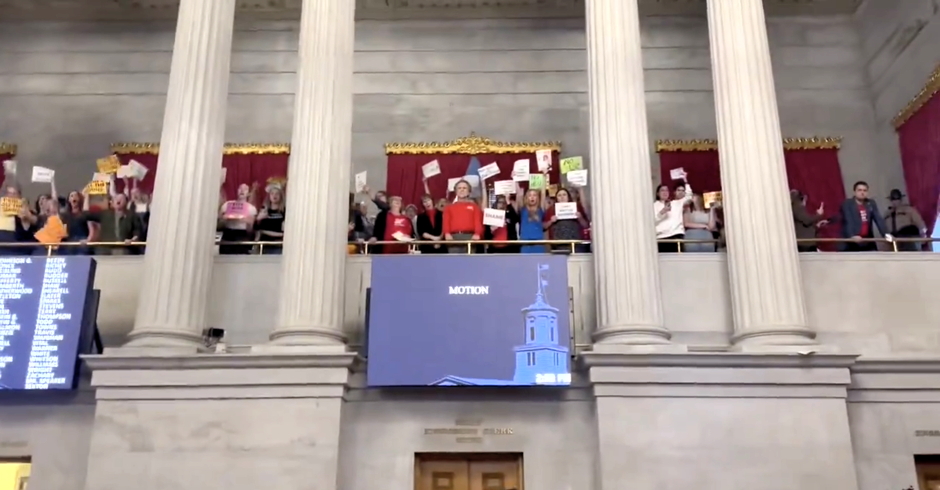News
35 States Still Have Same-Sex Marriage Bans on the Books – Dems Say Same-Sex Marriage Bill Has Enough Votes to Pass

Democrats and Republicans working to pass a limited same-sex marriage protection bill say they have enough votes to avoid a 60-vote filibuster. Senate Majority Leader Chuck Schumer has announced the legislation will hit the floor Wednesday.
“We have the votes” to overcome a filibuster on the Senate’s same-sex marriage protection bill, a “source close to negotiations” told HuffPost Monday.
Despite the U.S. Supreme Court striking down bans on same-sex marriage in its landmark 2015 Obergefell v. Hodges ruling, 35 states still have marriage equality bans “in their constitutions, state law, or both,” according to a Pew Charitable Trusts’ Stateline report in July.
Supporters of same-sex marriage want the Senate to act quickly, given U.S. Supreme Court Justice Clarence Thomas has encouraged marriage equality opponents to bring cases that could allow the Court to strike down its ruling in Obergefell. As many Americans learned this summer when the Court struck down its 49-year old ruling in Roe v. Wade, laws that remain on the books can go back into effect immediately.
READ MORE: Katie Hobbs Projected Winner as Kari Lake Launches Election Denial Attacks
CNN’s Manu Raju adds that U.S. Senator Tammy Baldwin, the bill’s lead Democratic sponsor, “told me they have enough votes to break a filibuster.”
Senator Thom Tillis (R-NC), “says there are the 10 republican votes needed to pass the Senate bill to codify federal protections for same sex marriage,” NBC News’ Frank Thorp V tweeted on Monday.
Contrary to some reports, however, the legislation does not “codify” Obergefell.
The bill, officially the Respect for Marriage Act, protects both same-sex and interracial marriages. It is very narrow and does not require states to allow same-sex couples to marry, but merely requires the federal government and states to recognize same-sex marriages. States would be required to honor the marriages of same-sex couples if their marriage was legal at the time they were married. In other words, if a state bans same-sex marriage it will be required to fully honor any marriage of a same-sex couple from its own state or another state, and cannot void existing marriages.
It also repeals DOMA, the Defense of Marriage Act of 1996 that originally banned the federal government from recognizing same-sex marriages. The U.S. Supreme Court struck down that portion in 2013, in the famous United States v. Windsor case brought by LGBTQ hero Edie Windsor.
Democrats want to pass the Respect for Marriage Act before the next Congress, especially if Republicans win the House majority. A House version passed with nearly four dozen GOP votes this past summer, although 157 Republicans voted against it.
Several Senate Republicans still oppose the bill, with one, Marco Rubio of Florida, having called it a “stupid waste of time.”
In July, exposing the large number of Republicans opposed to marriage equality, U.S. Senator Ben Sasse of Nebraska, considered a “moderate” Republican, blasted Speaker Nancy Pelosi after the Respect for Marriage Act passed the House.
“Is there a single case about it?” he asked, according to NBC News’ Thorpe. “I’m not not answering questions that are about hypotheticals that are just Pelosi trying to divide America with culture wars. I think it’s just the same bullshit. She’s not an adult.”
Nearly half the GOP Senate caucus refused to even respond to CNN’s polling this summer.
Some Republicans seemed more likely to support the bill after Democrats added an amendment stating the legislation does not legalize polygamy, which Republicans have historically falsely equated with same-sex marriage. The bill also does not restrict religious rights.
The amendment, according to Senator Baldwin, protects “all religious liberty and conscience protections available under the Constitution or Federal law, including but not limited to the Religious Freedom Restoration Act, and prevents this bill from being used to diminish or repeal any such protection.”
It also “Confirms that non-profit religious organizations will not be required to provide any services, facilities, or goods for the solemnization or celebration of a marriage.”
Enjoy this piece?
… then let us make a small request. The New Civil Rights Movement depends on readers like you to meet our ongoing expenses and continue producing quality progressive journalism. Three Silicon Valley giants consume 70 percent of all online advertising dollars, so we need your help to continue doing what we do.
NCRM is independent. You won’t find mainstream media bias here. From unflinching coverage of religious extremism, to spotlighting efforts to roll back our rights, NCRM continues to speak truth to power. America needs independent voices like NCRM to be sure no one is forgotten.
Every reader contribution, whatever the amount, makes a tremendous difference. Help ensure NCRM remains independent long into the future. Support progressive journalism with a one-time contribution to NCRM, or click here to become a subscriber. Thank you. Click here to donate by check.
 |



























